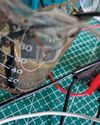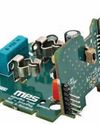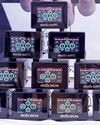THE ENVIRONMENTAL PARADOX Of Tech Manufacturing
Electronics For You
|April 2025
Electronics powers our world, but at what cost? Massive energy consumption, hazardous chemicals, and waste plague PCB and IC manufacturing. Can tech go green before it is too late?
-

The manufacturing of printed circuit boards (PCBs) and integrated circuits (ICs) stands at the core of our tech-driven world but brings significant environmental concerns. In 2023 alone, Taiwan Semiconductor Manufacturing Company (TSMC), a leading industry player, used a staggering 25,000 gigawatt hours of energy and approximately 101 million cubic metres of water. These figures highlight the immense resource consumption typical in semiconductor manufacturing, which involves millions of silicon wafers and hazardous chemicals. Given the current environmental challenges, how sustainable are these practices?
PCB manufacturing mirrors these environmental concerns. The process heavily relies on chemicals such as ferric chloride and copper chloride, particularly during the etching phase. Moreover, the primary material used is Flame Retardant 4 (FR4), a type of epoxy resin derived from petroleum, underscoring the reliance on fossil fuels. The procedure is notably wasteful, discarding about 70% of copper through subtractive methods. This not only wastes valuable resources but also significantly harms the environment. Have you considered the scale of waste generated by such processes?
Disposal poses another major issue. At the end of their life cycle, vast amounts of metals, plastics, and other materials from electronic devices often end up in landfills, leading to potential soil and water contamination. Some are incinerated to recover energy, which, unfortunately, contributes to air pollution.
Diese Geschichte stammt aus der April 2025-Ausgabe von Electronics For You.
Abonnieren Sie Magzter GOLD, um auf Tausende kuratierter Premium-Geschichten und über 9.000 Zeitschriften und Zeitungen zuzugreifen.
Sie sind bereits Abonnent? Anmelden
WEITERE GESCHICHTEN VON Electronics For You

Electronics For You
Tech Majors Are Racing TOWARDS NET-ZERO - What About You?
Apple, Microsoft, Amazon, Google, Infosys, Wipro—global and Indian firms are heading closer to achieving net-zero emissions, a mandate to combat climate change. Here is what you need to know to start your journey...
12 mins
December 2025

Electronics For You
Miniature IoT WATER TDS And LEVEL MONITOR Cum CONTROLLER
For setups that rely on stored water, clear awareness of tank level and water quality is essential.
3 mins
December 2025

Electronics For You
The Impact Of GENERATIVE AI On The Future Of AUTOMOTIVE AND EVs
Autonomous vehicles, connected ecosystems, and smart factories are only the beginning. Generative Al is pushing the auto industry beyond predictions into a bold era of creativity-from EV design to real-time diagnostics and showroom automation. Here is how GenAl is reshaping innovation across the automotive value chain.
8 mins
December 2025

Electronics For You
How AI Tools Are Making SOFTWARE DEVELOPMENT BETTER
AI is reshaping how we code, debug, and collaborate. From Copilot to automation, it is changing software development in ways worth exploring.
3 mins
December 2025
Electronics For You
How AI Tools Are Making SOFTWARE DEVELOPMENT BETTER
AI is reshaping how we code, debug, and collaborate. From Copilot to automation, it is changing software development in ways worth exploring.
3 mins
December 2025

Electronics For You
5 Interesting Reference Designs FOR SMART HOMES
Smart home devices are transforming the way people interact with their appliances. They make homes more convenient, secure, and energy-efficient. From smart plugs and energy monitors to smart locks and thermostats, reference designs help design engineers create connected products that are easy to use, consume less power, and are reliable. These designs allow you to control devices remotely, track energy use, extend battery life, and automate routines. They provide practical solutions for upgrading homes and small commercial spaces without major modifications.
3 mins
December 2025

Electronics For You
Fancy USB LED VASE
This USB LED vase is a simple yet elegant device that fuses art with electronics to create a decorative lighting display. Powered directly from a standard USB port, it uses readily available components such as MOSFETs, resistors, capacitors, and LEDs to produce a striking, dynamic sequence of lights.
3 mins
December 2025

Electronics For You
"WHAT OTHERS SELL IN FOUR BOXES WE BUILT IN ONE"
Years of custom field work are shaping a product line with its own cloud, its own hardware, and a market that is now beginning to recognise its value.
8 mins
December 2025

Electronics For You
BUILD LARGE LANGUAGE MODELS
Large language models are machine learning models designed for a range of language-related tasks such as text generation and translation. Here’s how open source software can help you build your own large language model.
6 mins
December 2025

Electronics For You
Rare Earth Or Rare Ingenuity? India Remains Between The Two
With China firmly controlling rare earth exports, India confronts a critical moment in its technological trajectory.
8 mins
December 2025
Listen
Translate
Change font size

